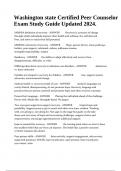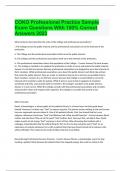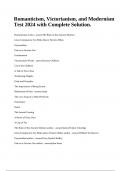WHAT IS DEVELOPMENT ECONOMICS?
o Development economics is defined as the structural transformation of an
economy such that it yields economic growth or the potential for sustained
well-being :
The word potential is used deliberately in the definition because while
catch-up growth may be yielded, it is not certain that the benefits of
economic development will be concentrated to the overall society,
instead the wealthy and political connected individuals frequently
exercise this benefit.
o Structural transformation is defined as the shift of an economy's structure
from low-productivity, labor- intensive activities to higher productivity,
capital and skill intensive activities.
o Economic growth is defined as the percentage increase in per capita Gross
National Product (GNP) or GDP over a specified time period.
o Economic development needs to be distinguished from political, social or
human, ecological and other forms of development which contribute to
ensuring diffused and sustained wellbeing.
Siyanda Zwane | UNIVERSITY OF CAPE TOWN
, IS “DEVELOPMENT ECONOMICS” REALLY A FIELD? (CASE AGAINST)
o The case against development economics being taught as a separate field
from neoclassical economics is as follows:
The use of scientific method generates hypothesis which apply across
the board to all human behaviour:
Since economistic human behaviour is viewed by mainstream
to be universally the same (utility and profit maximization in
consumption and production respectively).
Development economics is at best a conglomeration of topics that
represent the application of insights from different fields in
mainstream economics to the problems of L/LMICs and as such there
is no justification for economic development as a separate field. (it
does not have its own logic)
CASE FOR: DIFFERENT INITIAL AND CURRENT CONDITIONS IN L/LMICS
o L/LMICs faced vastly different initial conditions including colonialism.
o There are common structural conditions pertaining to L/LMIC economies
that do not comply with accepted standards approaches (heterodox)
argue result in limited relevance of the direct neoclassical or Keynesian
models to redress their economic development problems:
Theses structural commonalities identified by developmentalists and
structuralists include:
Missing markets
Asymmetrical or missing information
High risks
Market segmentation and dualism
o These approaches argue that these structural commonalities require
different kind of theorization.
Siyanda Zwane | UNIVERSITY OF CAPE TOWN
, PARADIGMS, APPROACHES AND METHOD IN DEVELOPMENT IN DEVELOPMENT
ECONOMICS .
o Economists who speak the same language, share common values and
beliefs, and have the same consensus on the body of tested knowledge
can be viewed as operation within a “paradigm”.
o One can think of a paradigm broadly as a world view that in economics is
driven by ideology.
o Socialists have a world view that rejects private ownership of the means of
production because by virtue of private ownership and market
transactions, capital, they believe exploits labour ( they support a planned
economy)
o Capitalists have an alternate world view that privileges individual liberty,
and their view of private ownership of the means of production and market
transactions ensure this and also ensure efficiency.
o Economic models are utilized to theorize and add to the body of secure
knowledge on a particular theory within a particular field:
This is the model utilized by mainstream economist, including those
working in development economics field, and their contention is that
they practice positive science and in this regard view other
approaches as ad hoc or non-scientific
o The common criticism against the possibility of engaging in positive science
are that values and biases creep into the work of social scientists in many
ways:
Biases are revealed in the particular choice of subjects chosen by a
particular researcher.
Theorizing require postulates (suggestions or assumptions) and
researchers preferences may determine the choice of postulates.
Economics is a social rather than the exact science and biases may
color research findings.
Siyanda Zwane | UNIVERSITY OF CAPE TOWN
o Development economics is defined as the structural transformation of an
economy such that it yields economic growth or the potential for sustained
well-being :
The word potential is used deliberately in the definition because while
catch-up growth may be yielded, it is not certain that the benefits of
economic development will be concentrated to the overall society,
instead the wealthy and political connected individuals frequently
exercise this benefit.
o Structural transformation is defined as the shift of an economy's structure
from low-productivity, labor- intensive activities to higher productivity,
capital and skill intensive activities.
o Economic growth is defined as the percentage increase in per capita Gross
National Product (GNP) or GDP over a specified time period.
o Economic development needs to be distinguished from political, social or
human, ecological and other forms of development which contribute to
ensuring diffused and sustained wellbeing.
Siyanda Zwane | UNIVERSITY OF CAPE TOWN
, IS “DEVELOPMENT ECONOMICS” REALLY A FIELD? (CASE AGAINST)
o The case against development economics being taught as a separate field
from neoclassical economics is as follows:
The use of scientific method generates hypothesis which apply across
the board to all human behaviour:
Since economistic human behaviour is viewed by mainstream
to be universally the same (utility and profit maximization in
consumption and production respectively).
Development economics is at best a conglomeration of topics that
represent the application of insights from different fields in
mainstream economics to the problems of L/LMICs and as such there
is no justification for economic development as a separate field. (it
does not have its own logic)
CASE FOR: DIFFERENT INITIAL AND CURRENT CONDITIONS IN L/LMICS
o L/LMICs faced vastly different initial conditions including colonialism.
o There are common structural conditions pertaining to L/LMIC economies
that do not comply with accepted standards approaches (heterodox)
argue result in limited relevance of the direct neoclassical or Keynesian
models to redress their economic development problems:
Theses structural commonalities identified by developmentalists and
structuralists include:
Missing markets
Asymmetrical or missing information
High risks
Market segmentation and dualism
o These approaches argue that these structural commonalities require
different kind of theorization.
Siyanda Zwane | UNIVERSITY OF CAPE TOWN
, PARADIGMS, APPROACHES AND METHOD IN DEVELOPMENT IN DEVELOPMENT
ECONOMICS .
o Economists who speak the same language, share common values and
beliefs, and have the same consensus on the body of tested knowledge
can be viewed as operation within a “paradigm”.
o One can think of a paradigm broadly as a world view that in economics is
driven by ideology.
o Socialists have a world view that rejects private ownership of the means of
production because by virtue of private ownership and market
transactions, capital, they believe exploits labour ( they support a planned
economy)
o Capitalists have an alternate world view that privileges individual liberty,
and their view of private ownership of the means of production and market
transactions ensure this and also ensure efficiency.
o Economic models are utilized to theorize and add to the body of secure
knowledge on a particular theory within a particular field:
This is the model utilized by mainstream economist, including those
working in development economics field, and their contention is that
they practice positive science and in this regard view other
approaches as ad hoc or non-scientific
o The common criticism against the possibility of engaging in positive science
are that values and biases creep into the work of social scientists in many
ways:
Biases are revealed in the particular choice of subjects chosen by a
particular researcher.
Theorizing require postulates (suggestions or assumptions) and
researchers preferences may determine the choice of postulates.
Economics is a social rather than the exact science and biases may
color research findings.
Siyanda Zwane | UNIVERSITY OF CAPE TOWN









